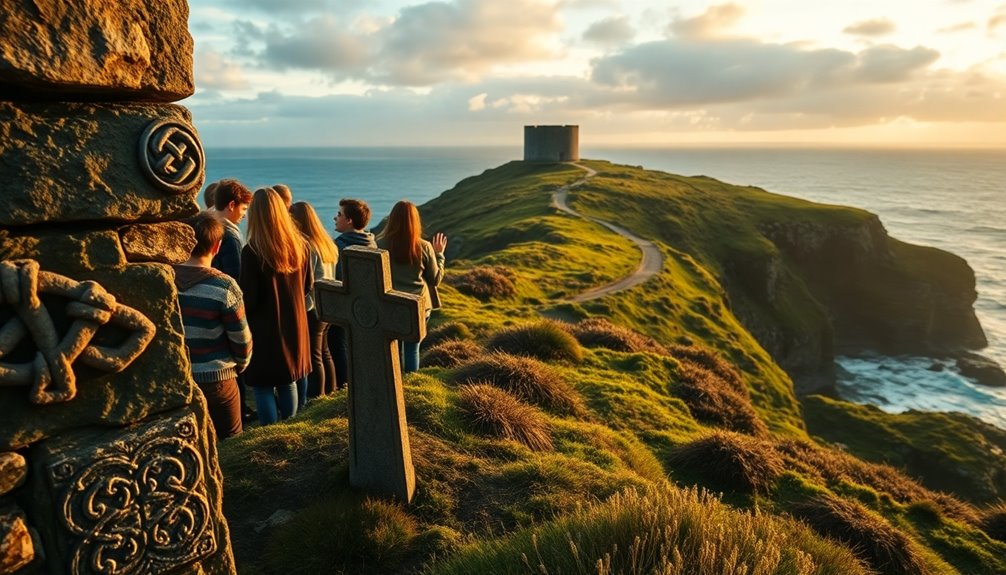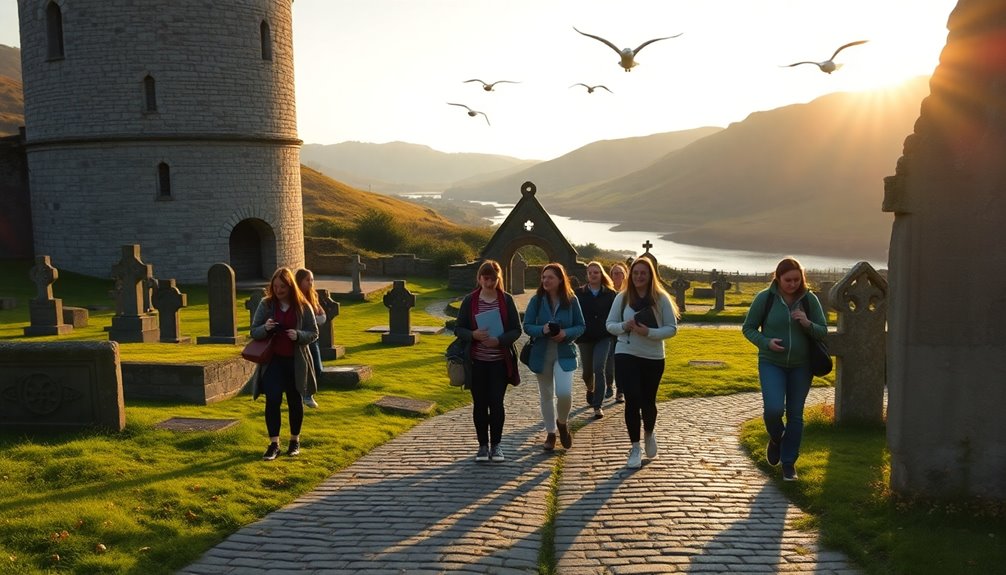
You’ll jump into Ireland’s living heritage through music, dance, language, food, and community events that welcome curious students. Join céilís, pub sessions, and workshops to learn reels, try instruments, or take Gaeilge classes with locals. Explore historic sites on guided or self-guided walks, sample regional dishes at festivals, and support local makers. Be respectful, ask before photographing, and tip generously. Keep exploring these pages to find practical steps, event tips, and ways to give back.
Key Irish Cultural Events for Students
When you first arrive, immerse yourself in Ireland’s big cultural events—St. Patrick’s Day parades, Bloomsday, and Galway’s arts festivals give you space to roam, meet locals, and celebrate openly. You’ll join crowds where Irish storytelling thrives in pubs, galleries, and street performances, and you’ll trade ideas during cultural exchanges that broaden your view. Seek community-run events and student-focused programs so you can participate, not just observe. Carry curiosity: ask questions, swap stories, and volunteer at workshops to make connections that last. These events let you experience Irish identity without constraints, helping you shape your own path while learning history, literature, and contemporary life. Jump in and claim the freedom to explore.
Traditional Music and Dance Experiences
You can join live traditional music sessions to hear reels and jigs played in an authentic setting. Try a céilí or set dance to learn group steps and meet other students. Sign up for instrument workshops to get hands-on practice with fiddles, tin whistles, or bodhráns.
Live Session Opportunities
Several lively options await students who want hands-on traditional music and dance experiences: pub-style céilí sessions, classroom workshops with fiddle, tin whistle or bodhrán tutors, and community dance nights where you can learn step, set, or céilí figures. You can join live streaming events when you’re abroad or short on time, watching sessions in real time and asking questions. Online workshops let you practice at your pace, with tutors giving feedback via video. Seek flexible hosts who welcome beginners and encourage improvisation, so you can explore without pressure. Check university societies, cultural centres, and local musicians’ pages for schedules. Bring curiosity, an open mind, and your own rhythm — you’ll leave freer and more connected.
Ceili and Set Dancing
Although rooted in communal tradition, céilí and set dancing are instantly approachable: you’ll learn figures, calls, and timing while sharing space with others, whether in a packed hall or a smaller workshop. You’ll be free to move, improvise within steps, and choose your pace, but basic ceili etiquette matters: arrive on time, listen to the caller, and respect partners’ comfort. Set formations give structure while letting you express style; once you grasp progressions and walls, you’ll enjoy playful exchanges and moments of solo flair. Classes teach patterns quickly, so you won’t feel boxed in. Whether joining for fun or cultural curiosity, you’ll leave more confident, less cautious, and ready to return to the floor.
Instrument Workshops
Anyone can pick up a bodhrán, fiddle, tin whistle, or bouzouki in an instrument workshop and get a hands-on feel for traditional Irish music. You’ll try basic instrument techniques quickly, learning rhythms and ornamentation that reveal tunes without pressure. Instructors encourage improvisation, so you can bend rules, experiment, and find your own voice. Workshops often mix players of different levels, creating spontaneous musical collaborations that teach listening as much as playing. You’ll trade tips, swap tunes, and join céilí sessions or informal jams by the end of a single meeting. If you crave freedom and connection, these sessions give practical skills plus the confidence to play publicly, collaborate across styles, and keep Ireland’s living tradition moving forward.
Exploring Irish Language Opportunities
If you want to connect with Irish culture, learning a bit of Gaeilge opens doors to music, literature, and local life that English alone can’t reach. You’ll find language immersion classes, online bilingual resources, and casual conversation groups that fit your schedule and need for independence. Pick a course that lets you practice with locals, stream traditional songs, and read short stories to build confidence. Use apps for quick daily practice and join pop-up cafés where Gaeilge is welcome. Below’s a compact guide to options to help you choose freely and confidently.
| Option | Format | Best for |
|---|---|---|
| Community class | In-person | Conversational practice |
| Online course | Self-paced | Busy schedules |
| Meetup | Casual | Social speaking |
| App | Mobile | Daily bite-size practice |
Historic Sites and Heritage Walks

Once you’ve picked up a few phrases and found places to speak Gaeilge, bring that curiosity into the streets and ruins where history lives. You’ll wander among historic landmarks that map centuries of rebellion, settlement, and creativity, and you’ll feel the space between past and present. Choose self-guided routes when you want solitude and reflection, or join guided tours to hear stories that flesh out stones and battlements. Walk coastal cliffs, quiet graveyards, and urban lanes at your own pace, following signs or a downloaded route. Let the freedom to roam shape your learning: pause where a view or plaque moves you, chat with locals, sketch, or sit and read. These walks turn history into a personal experience.
Food, Festivals, and Local Traditions
When you follow the scent of fresh soda bread and seafood chowder through a market or festival, you’ll find Ireland’s stories served on a plate: regional cheeses, smoked fish, and seasonal produce reflect local histories and pride. You’ll taste Irish cuisine that’s simple, bold, and tied to land and sea; you’ll learn how recipes changed with migration and resilience. Festivals bring music, dance, and food together, showing community identity without rules about who can enjoy them. You’ll appreciate festive customs that honor saints, harvests, and local heroes while leaving space for personal expression. Look, listen, and sample—your curiosity will guide you to authentic experiences that respect tradition and welcome freedom.
- Sea-to-table dishes and artisan breads
- County fairs and seasonal markets
- Traditional music paired with local fare
How to Participate in Community Celebrations
You can join local parades by signing up with a community group or school band and learning a few simple steps or songs. Volunteering at events like festivals and fairs is a great way to meet people and help run activities or food stalls. Check community boards or social media to find opportunities and sign-up details.
Local Parade Participation
If you want to join a local parade, start by checking community calendars and contacting organizers to learn registration deadlines, costume guidelines, and safety rules. You’ll find chances to celebrate local traditions while expressing your own style. Ask about march routes, staging areas, and any age or group limits. Respect cultural cues, but feel free to adapt parade costumes to reflect your identity and comfort. Bring water, ID, and a small first-aid kit. Stay aware of crowd flow and follow marshals’ directions so everyone stays safe and free to enjoy the event.
- Coordinate with a group or go solo based on your vibe
- Blend historical elements with personal flair
- Learn local traditions beforehand to show respect
Volunteering at Events
Because volunteering at community celebrations lets you meet people, learn traditions, and support events behind the scenes, it’s one of the best ways to take part beyond spectating. You’ll find roles in event planning, logistics, or hospitality that match your skills and desire for autonomy. Reach out through community outreach channels—social media groups, local cultural centers, or university clubs—to discover opportunities that fit your schedule. Volunteering gives you hands-on access to music, dance, and storytelling while you help shape the experience for others. Say yes to tasks that challenge you, but set boundaries so you keep freedom in your time. Keep communication clear, show up reliably, and you’ll build connections and practical skills that last well after the celebration ends.
Practical Tips for Safe and Respectful Engagement
When engaging with Irish heritage sites, traditions, or communities, approach with curiosity and humility—listen first, ask permission before photographing or handling artifacts, and follow posted rules or local guidance. You’ll want to practice cultural sensitivity and embrace respectful tourism: learn basic phrases, honor sacred spaces, and support local businesses. Stay aware of access restrictions, weather risks, and crowds so you can explore freely without causing harm. Respect people’s stories, and don’t assume ownership of traditions — you’re a guest, not a curator.
- Ask before photographing people or private events.
- Follow signage, stay on paths, and avoid touching fragile sites.
- Buy local, tip generously, and credit knowledge holders.
These steps keep your travels responsible, freeing you to connect authentically.
Some Questions Answered
Can I Intern at an Irish Heritage Museum as a Student?
Yes — you can intern at an Irish heritage museum as a student; you’ll find museum internships offering cultural immersion, flexible project roles, and chances to shape experiences, so you can explore freely, learn deeply, and contribute creatively.
Are There Scholarships for Studying Irish History or Language?
Like a map unfolding, yes — you’ll find Irish history scholarships and language study grants from universities, cultural foundations, and government programs; you can chase them freely, apply strategically, and fund immersive study or research abroad.
Can Non-Irish Students Perform in Traditional Céilí Bands?
Yes — you can join céilí music groups; you’ll find bands welcoming non-Irish players as part of cultural exchange, and you’ll be encouraged to learn repertoire, respect traditions, and express your own creative freedom within sessions.
How Accessible Are Heritage Sites for Students With Disabilities?
Like a lighthouse guiding ships, you’ll find many heritage sites increasingly accessible: ramps, audio guides, tactile exhibits and clear signage. You’ll want to seek inclusive programs and accessibility features that respect your independence and freedom to explore.
Can I Trace My Irish Ancestry While Studying Here?
Yes — you can trace your Irish ancestry while studying here. You’ll use genealogy research, blend online resources with archives and local records, connect with community groups, and follow leads freely at your own pace and curiosity.
